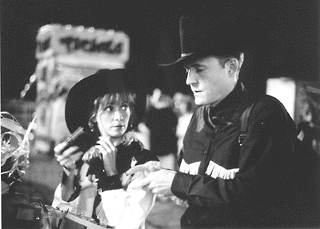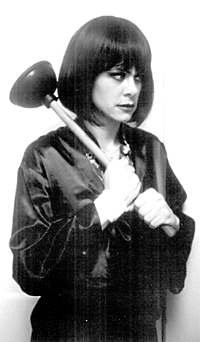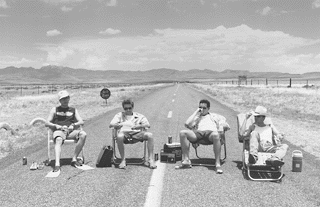https://www.austinchronicle.com/screens/1998-03-13/523020/
Featuring Texas
Films From Around the State
By Marc Savlov, March 13, 1998, Screens
|
|
As in previous years, South by Southwest '98 boasts an impressive lineup of native works ranging from the sublime to the sublimely silly, and from the elegiac to the explosively energetic. Leave it to Texans to come up with everything from pistol-packin' grannies to an intimate portrait of father-daughter relations amid Houston's landed gentry, and still leave room for a short film called "Radioactive Crotch Man." Not surprisingly, the documentary form is represented by several works, one of the most surprising of which is Kyle Henry's American Cowboy, a portrait of the International Gay Rodeo Association. Henry trains his sights on longtime bronc-buster Gene Mikulenka, and follows him not only from rodeo to rodeo but also in and around the avenues of his daily life as he frets about asking his boyfriend Steven to marry him, is severely injured in a bull-riding mishap, and finally comes out to his family.
"Two years ago," relates Henry, a former programmer with the Austin-based CinemaTexas Film Festival, "a friend of mine sent me an article from Out magazine. At that time, I wasn't even thinking of doing a documentary, and it just was such an interesting idea that it really intrigued me. Then when I met Gene, he was such a character and seemed to be such a performer that I just knew that there was definitely a story there."
Antone and the Blues: A Story of Obsession, Robb Niles' documentary tracing the life and times of blues magnate Clifford Antone, is another purely Texas documentary. For decades, Antone has been the driving force behind Austin's righteous blues scene, presiding through thick and thin over his self-named venue, and introducing Texans and everyone else to such legends as brothers Stevie Ray and Jimmie Vaughan, among others.
According to Niles, who became hooked on the blues at the age of 22 after seeing Otis Rush at Antone's old Guadalupe location (the venue has since moved to downtown Austin), he "became addicted to Antone's club. It was actually the only club I'd ever been to that had been that smoke-filled that I actually enjoyed.
|
|
Also, the Festival features a special screening of local documentarian Paul Stekler's Vote for Me: Politics in America. This screening will be the first time Stekler's Emmy and Peabody Award-winning study of the American electoral process will be seen in its four-hour entirety.
Shot in Vancouver, British Columbia, but nonetheless a quintessentially Texan tale is Stacy Kirk's Barbecue... a Love Story, which hinges on Lucky Striche and his romantic impulses towards both slow-smoked barbecue and beautiful women. Despite his name, Lucky is anything but, making his home and marking his time in the type of last-chance trailer park so often glimpsed off East Texas highways.
"I got the idea [for Barbecue] from a band called Southern Culture on the Skids," says Kirk. "They do this song about falling in love and eating fried chicken, and so the idea started from there."
Kirk believes the Slacker-esque nature of the pleasantly off-kilter love triangle at the heart of Barbecue is a purely Texas construct, something that should have particular resonance here in Austin. "I sat on the film for a long time and didn't actually enter it in that many festivals because I didn't think it was appropriate for them. I think SXSW and Austin is really the perfect place for this film, though. I think the people will get it in a way that other people in other places might not; the whole idea of a man in love with barbecue is very Austin. I've noticed the people [from Austin] that I've shown the film to really seem to identify with him."
"I remember some years ago wanting to kind of do Our Town in West Texas, so to speak," recalls Tim McCanlies about his narrative feature, Dancer, Texas Pop. 81. "I had been looking for a structure and a way to do a couple of days in the life of a small town, when I came across the idea of using four guys, like the entire graduating senior high school class, who had all made a solemn vow to leave as soon as they graduate and now it's that weekend. And that was what gave me the structure and the time frame. And, of course, four different stories."
Dancer, which was picked up by TriStar just two weeks into shooting, is McCanlies' best experience to date: "I had been working in L.A. as a screenwriter for about the last 10 years, and had been getting more and more frustrated with the way things kept getting screwed up. I felt it was time for me to take a shot at screwing up my own work, so I was going to shoot the film on Super-16 with some of my friends and do it in and around Austin.
"As it turned out, I ended up with a lot more money than I thought I would and then a week into production John Calley, the head of TriStar's parent company, Sony, read the script and, literally overnight, picked up the film. When it first happened, I kind of panicked, thinking that there has to be some ulterior motive, such as bringing in another director or something, but they were completely wonderful. It's a) a Cinderella story, but b) when I direct again, it's all going to be downhill from here on out because I know I'll never have as great an experience as this."
You've never had a detention period like the one in Andy Anderson's new feature Detention, and you wouldn't want to, either. A "mystery/dark comedy" with caged students, out-of-control educators, and one big explosion, Anderson (the director of Positive I.D.) says, "It's going to be a controversial film, that's for sure."
Anderson echoes Tim McCanlies' sentiments about toiling in the studio salt mines. "I'd been writing for a lot of studios," he remarks, "but it was really frustrating to write something and then never see anything happen with it. You get a tremendous amount of money for that, but you don't ever really get to see anything get done, so I decided to write something that would have some real heat to it, but would also be very quirky, dark, and funny. And at the same time write something that was producible on my own."
Shot in and around the Houston area, Greg Carter's Fifth Ward takes elements of recent urban melodramas such as Boyz N the Hood and Menace II Society and twists them into a skein of three interwoven storylines. A gritty, street-level drama that follows the tough and often violent turns in young urban life, Carter focuses his story on 18-year-old James Kennedy, a young black brother struggling to be more than a hood ornament. As Fifth Ward opens, he's graduating from high school and preparing for college when his older brother RayRay is killed in a drug-related homicide. Shaken, James begins to re-evaluate his life amongst the gangs and bullets of Houston's notorious Fifth Ward.
"Coming out of Columbia grad film school, I had been looking for a film to shoot," relates Finding North's director Tanya Wexler, "and I thought this script was just wonderful. It takes place about one-fourth in New York and then the rest takes place in a fictionalized Denton [Texas], which is where we shot. When I was looking to get the film shot, since I was a director and not a producer, I needed someone who understood how to make a small indie film in Texas and met Stephen Dyer (Late Bloomers) through friends and that was that."
|
|
The film centers around the character of Travis, a young New Yorker who, in the wake of his lover's death from AIDS, decides to kill himself, changes his mind, and then heads off to the small Texas town where his boyfriend grew up, trailed by a Brooklyn bank teller who doesn't realize he's gay. Together, this unlikely pair listen to the dead man's recordings and struggle to make sense of an unfinished life.
"The film really is a lot about geography," remarks Wexler. "It's about these two fish-out-of-water New Yorkers who basically go to Texas to solve the crisis they find themselves in. And so Texas becomes this kind of place where they can get out of the busy, crazy New York kind of life that has enveloped them and find a different way to think about things. It's really a sweet movie. We called it Finding North because there's a line, `When you can't get any further south, you've got to start finding north.' Texas becomes the place where they can start finding their emotional truth."
Coming from a totally different Houston than the one evidenced in Fifth Ward is Tessa Blake's Five Wives, Three Secretaries and Me, a witty, incisive documentary about the filmmaker's bon vivant businessman father Tommy Blake - a Houston oil man, Hollywood playboy, hotshot lawyer, and serial monogamist with a serious sense of fun.
Blake, who returned to her family's Houston home in 1994 to receive a million-dollar trust at the age of 25, arrived with a camera and crew, intent on chronicling the many marriages, ex-wives, and various shenanigans of her society-bred father, as well as her own upbringing. Class, race, and, above all, money play a part, and Blake unflinchingly aims her questions and camera with unerring ease.
Producer Jason Lyon notes that Five Wives, Three Secretaries and Me explores not only the arcane world of Houston's upper caste, but also the close relationship between Tessa and her father. "The film tackles both subjects, actually. It uses that whole Texas, monied, society thing as a backdrop to look at parent-child relationships. [Tommy] hasn't actually seen the film yet - the SXSW screening will be his first time, and it deals with some touchy stuff, such as an interracial relationship that Tessa was in. I think he may be uncomfortable seeing some of it onscreen, but in the end I think he'll be pleased with the results."
"Wacky" isn't a word usually associated with the serial-killer/road-movie genre, but Gray Miller's unabashedly antic Hellzapoppin' is just that. It's also 30 minutes of inspired lunacy, rampaging, nihilistic senior citizens on the loose, existential grief that Sartre would shy away from, and Tex Avery-styled theatrics, all set to a pumping, grinding rock & roll score and some seriously warped Foley work.
"[The film] came out of that period a few years back when teen road movies were all the rage," says Miller, "and all these films featured 17- and 18-year-olds that were really feeling desperate and were driven to all this extreme behavior. I thought, look, you're 17 or 18, you may feel like you have nothing to lose, and things are really bad, but they're not. Not really. When you're like 80, that's when things are going to be bad, that's when you're going to feel like you've really got just nothing to lose. You might feel miserable when you're a teenager, but you're going to be miserable when you're 80. And it all kind of came out of that."
Miller, a Texas native currently residing in New York City, has high praise for the Texas shoot, which involved, among other things, lots of real guns. "The coolest thing about shooting in Texas was that when we were going out to shoot the gun scenes - I used real guns, with blanks. I called the Texas Film Commission to find out about the proper permits I'd need. I told them I was going to go out in the desert and shoot off some guns for this short film I was doing, and they were like, `Uh, permits?' They said, `You know, there aren't any permits for that. You just go out there and if a cop stops you, just tell him what you're doing and if he believes you, you're okay; if not, you'll be in jail.' It was like, yee-haw!"
More gunsmoke than Matt Dillon could shake a six-shooter at arrives in Richard Linklater's The Newton Boys, a Western drama chronicling the misadventures of a group of real-life Uvalde, Texas siblings who went on to become the most successful bank robbers of all time. Featuring Matthew McConaughey, Skeet Ulrich, Ethan Hawke, Dwight Yoakam, Vincent D'Onofrio, and Julianna Margulies, the film is a departure for Austin's favorite son, a colorful historical drama that mixes the best of the West with Prohibition-era gangsters to create an entirely new breed of six-gun mayhem.
Olympia, by Robert Byington, is a comic melodrama about following dreams, no matter how remote they might seem to others. Olympia Miraflores, a Mexican soap opera actress, leaves her lucrative television position behind when she decides quite unexpectedly to head to El Norte and pursue her childhood dream of professional javelin throwing. Once there, she meets 34-year-old Bill Daniel, who becomes her unlikely coach. Olympia was filmed last summer around Austin and Laredo.
Currently residing in Los Angeles, Byington lived in Austin in the early Nineties while working on his Master's degree. He recalls "coming to Austin at a time when Slacker was starting to move a little" and the filmmaking community began to come alive. "At ACTV [now ACAC], you could just walk in there and say, `Hey, can I get a camera?' And they'd give you one. That's kind of weird to think about now."
Byington observes that "having been in Los Angeles for the last year and a half, it just seems like the films that get made regionally in the United States are necessarily going to be more personal than films made on the Coast. There are fewer obstacles and although there's less support regionally, the two things sort of balance each other."
In indie filmmaking's Big Book of Woe, few chapters are as outrageous as the one recounting Austinite Geneva Fowler's first film, Bones: "I shot that in and around Austin on an extremely low, El Mariachi budget a couple of years ago, and when I finished, I couldn't afford to get the film developed and so I stored it in my fridge while working on other projects. Well, my fridge caught on fire and Bones was destroyed along with my fridge."
Luckily for Fowler, her directorial debut was insured, which allowed her to cash in the ashes and try, try again, this time with the aptly titled Sanity, a dark comedy about a suicidal woman on the edge, which features longtime Austin actress Tonie Perensky (Return of the Texas Chainsaw Massacre).
"Sanity ended up taking about two years, and this time it was around a $100,000 budget, much larger than my first film. It's a black comedy, which seems, for some reason, to be a point that people are missing. For example, I got a call the other day from someone who said, `Oh, we hear you have a great drama!' Well, no, I have a black comedy, which is a just a little bit different."
As a rule, almost all the Texas films and, yes, their respective filmmakers as well, are "just a little bit different" this year, encompassing the low-tech, high-comedy concepts of McCanlies' Dancer, Texas Pop. 81 to the all-star Cavalcade of Hollywood Handsomeness that is The Newton Boys. In between, there's everything from a heartfelt, humorous ode to the joys of slow-cooked steer to a tale of javelin-throwing as existential metaphor. Come to think of it, "different" has been the hallmark of Texas filmmakers for some time now, and really, where else are you going to find documentaries about queer cowboys and Houston's wealthy oil barons running back to back? Only in Texas.
Copyright © 2024 Austin Chronicle Corporation. All rights reserved.



